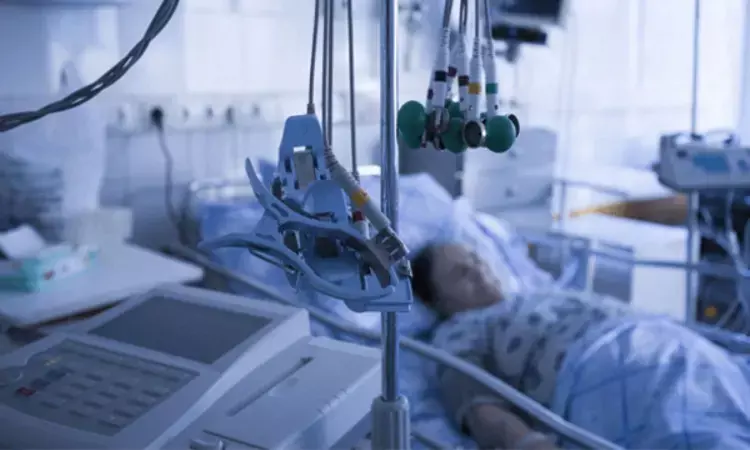- Home
- Medical news & Guidelines
- Anesthesiology
- Cardiology and CTVS
- Critical Care
- Dentistry
- Dermatology
- Diabetes and Endocrinology
- ENT
- Gastroenterology
- Medicine
- Nephrology
- Neurology
- Obstretics-Gynaecology
- Oncology
- Ophthalmology
- Orthopaedics
- Pediatrics-Neonatology
- Psychiatry
- Pulmonology
- Radiology
- Surgery
- Urology
- Laboratory Medicine
- Diet
- Nursing
- Paramedical
- Physiotherapy
- Health news
- Fact Check
- Bone Health Fact Check
- Brain Health Fact Check
- Cancer Related Fact Check
- Child Care Fact Check
- Dental and oral health fact check
- Diabetes and metabolic health fact check
- Diet and Nutrition Fact Check
- Eye and ENT Care Fact Check
- Fitness fact check
- Gut health fact check
- Heart health fact check
- Kidney health fact check
- Medical education fact check
- Men's health fact check
- Respiratory fact check
- Skin and hair care fact check
- Vaccine and Immunization fact check
- Women's health fact check
- AYUSH
- State News
- Andaman and Nicobar Islands
- Andhra Pradesh
- Arunachal Pradesh
- Assam
- Bihar
- Chandigarh
- Chattisgarh
- Dadra and Nagar Haveli
- Daman and Diu
- Delhi
- Goa
- Gujarat
- Haryana
- Himachal Pradesh
- Jammu & Kashmir
- Jharkhand
- Karnataka
- Kerala
- Ladakh
- Lakshadweep
- Madhya Pradesh
- Maharashtra
- Manipur
- Meghalaya
- Mizoram
- Nagaland
- Odisha
- Puducherry
- Punjab
- Rajasthan
- Sikkim
- Tamil Nadu
- Telangana
- Tripura
- Uttar Pradesh
- Uttrakhand
- West Bengal
- Medical Education
- Industry
Personalized Therapy and time to PCI improves outcomes for AMI-CS Patients undergoing ECMO: Study

Patients who have acute myocardial infarction (AMI) complicated by cardiogenic shock (CS) experience elevated mortality rates. The use of Extracorporeal Membrane Oxygenation (ECMO) therapy is vital in providing essential support in such cases. However, it is essential to identify the key factors that impact patient outcomes to enhance survival rates. Recent study aimed to investigate the impact of Extracorporeal Membrane Oxygenation (ECMO) therapy on patient outcomes in cases of acute myocardial infarction (AMI) complicated by cardiogenic shock (CS). The retrospective study included 63 patients who underwent ECMO therapy for AMI and CS. Patients were categorized into survivors and non-survivors based on 30-day outcomes. Non-survivors exhibited significantly higher arterial blood lactate levels and required more intensive vasoactive support. They experienced longer delays from symptom onset to percutaneous coronary intervention (PCI) and had higher prevalence of left main coronary artery disease and triple vessel disease. Logistic regression analysis revealed that elevated arterial blood lactate levels, Vasoactive-Inotropic Score (VIS), and delayed time to PCI were significantly associated with worse outcomes. ROC analysis identified these factors as significant predictors of prognosis. Factors such as BMI, age, cerebrovascular disease, and hypertension did not show significant differences between survivors and non-survivors.
Importance of Timely Intervention
The study highlighted the importance of timely intervention, rapid revascularization, and effective management of metabolic disturbances in improving survival outcomes. Elevated arterial blood lactate, higher VIS, and longer time to PCI were identified as key prognostic factors for poor outcomes in AMI-CS patients on ECMO therapy. The study suggested that personalized therapeutic strategies based on these predictors could enhance clinical outcomes.
Study Limitations and Future Directions
Limitations of the study included its retrospective design, single-center nature, and lack of data on VA-ECMO flow rates. The study emphasized the significance of arterial lactate, time to PCI, and VIS as potential predictors of mortality in AMI-CS patients, offering a predictive framework for clinical decision-making in this population. Future research should focus on multicenter studies, incorporation of flow data, assessment of ECMO-related complications, and exploration of biological mechanisms linking predictors to mortality in AMI-CS patients undergoing ECMO therapy.
Key Points
- The study investigated the impact of ECMO therapy on patient outcomes in cases of acute myocardial infarction (AMI) complicated by cardiogenic shock (CS) through a retrospective analysis of 63 patients.
- Non-survivors had higher arterial blood lactate levels, needed more vasoactive support, longer delays to percutaneous coronary intervention (PCI), and higher prevalence of left main coronary artery disease and triple vessel disease compared to survivors.
- Logistic regression analysis revealed that elevated arterial blood lactate levels, Vasoactive-Inotropic Score (VIS), and delayed time to PCI were significantly associated with worse outcomes and identified as key prognostic factors for poor outcomes.
- The study emphasized the importance of timely intervention, rapid revascularization, and effective management of metabolic disturbances in improving survival outcomes for AMI-CS patients on ECMO therapy.
- Limitations of the study included its retrospective design, single-center nature, and lack of data on VA-ECMO flow rates, suggesting the need for future multicenter studies incorporating flow data and assessment of ECMO-related complications.
- The study proposed personalized therapeutic strategies based on predictors like arterial blood lactate, VIS, and time to PCI to enhance clinical outcomes and recommended exploration of biological mechanisms linking these predictors to mortality in AMI-CS patients undergoing ECMO therapy for future research directions.
Reference –
Guoying Zheng et al. (2025). Risk Factors Influencing The Prognosis Of Patients With Acute Myocardial Infarction And Cardiogenic Shock Undergoing Extracorporeal Membrane Oxygenation Therapy. *Journal Of Cardiothoracic Surgery*, 20. https://doi.org/10.1186/s13019-025-03348-3.
MBBS, MD (Anaesthesiology), FNB (Cardiac Anaesthesiology)
Dr Monish Raut is a practicing Cardiac Anesthesiologist. He completed his MBBS at Government Medical College, Nagpur, and pursued his MD in Anesthesiology at BJ Medical College, Pune. Further specializing in Cardiac Anesthesiology, Dr Raut earned his FNB in Cardiac Anesthesiology from Sir Ganga Ram Hospital, Delhi.
Dr Kamal Kant Kohli-MBBS, DTCD- a chest specialist with more than 30 years of practice and a flair for writing clinical articles, Dr Kamal Kant Kohli joined Medical Dialogues as a Chief Editor of Medical News. Besides writing articles, as an editor, he proofreads and verifies all the medical content published on Medical Dialogues including those coming from journals, studies,medical conferences,guidelines etc. Email: drkohli@medicaldialogues.in. Contact no. 011-43720751


